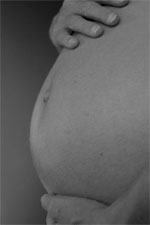 |
|
Wildfires: Information for Pregnant Women and Parents of Young Infants |
|
If you’re a pregnant woman who has been evacuated from your home,
please do the following:
- When checking into a shelter or temporary housing, tell the staff
you are pregnant or if
 you think you might be pregnant. you think you might be pregnant.
- Seek prenatal care even if it is not with your usual provider.
- If you have your prescription medicines with you, take them as
directed.
- If you don't have your prescription medicines with you, ask health
care providers at the shelter for assistance in getting them.
- Make sure health care providers know about any special needs or
health problems that you have, as well as any medicines you might be
taking (both over the counter and prescription.)
- Drink plenty of water.
- Avoid breathing smoke or fumes from recently burned buildings or
houses.
- Rest often.
If you’re a pregnant woman who might be evacuated from your home,
please do the following:
- Be prepared to evacuate quickly and have important items (listed
below) ready to go— you may not have much time.
- Take copies of any medical records with you.
- Take your prescription medicines with you.
- Bring bottled water to make sure you have plenty to drink.
- Be prepared to tell the staff at the shelter or temporary housing
you are pregnant or if you think you might be pregnant.
- Be prepared to continue your prenatal care— even with a different
provider, if necessary.
- Be prepared to tell the health care providers about any special
needs or health problems that you have, as well as any medicines you
might be taking (both over the counter and prescription.)
- Avoid breathing smoke or fumes and stay away from areas where there
is a lot of smoke. Stay indoors if possible.
- Rest often.
 If you are a parent with a young infant who has been evacuated from
your home, please do the
following: If you are a parent with a young infant who has been evacuated from
your home, please do the
following:
- When checking into a shelter or temporary housing, tell the staff if
you know of any special needs or health problems your baby has.
- If your young infant needs prescription or over the counter
medicine, and you have them, give them as directed.
- If you don't have your infant's medicine with you, ask health care
providers at the shelter for assistance in getting it.
- Make sure your baby gets plenty of breast milk or formula.
- Keep your baby away from areas where there is smoke or fumes, and
stay indoors if possible.
If you are a parent with a young infant who might be evacuated from
your home, please do the following:
- Be prepared to evacuate quickly and have important items (listed
below) ready to go— you may not have much time.
- Take copies of your baby's medical records with you.
- Take your baby’s medicines with you.
- Make sure your baby gets plenty of breast milk or formula— bring as
much as you can.
- Make sure health care providers at shelters or temporary housing
know of any special needs or health problems your baby has, as well as
any medicines your baby is taking (both over the counter and
prescription.)
- Keep your baby away from areas where there is smoke or fumes, and
stay indoors if possible.
Wildfires: Information for Pregnant Women
Please
visit the
March of Dimes, California Chapter
(http://www.marchofdimes.com/california/*), Web site for
-
Special information for pregnant women, and
-
Special information for families with infants or
anyone caring for a newborn
This information is available in English and in
Spanish.
|
* |
Links to non-Federal organizations found at this site are provided solely as a service to our users. These links do not constitute an endorsement of these organizations or their programs by CDC or the Federal Government, and none should be inferred. The CDC is not responsible for the content of the individual organization Web pages found at these links.
|
Page last reviewed: 11/25/08
Page last modified: 10/30/07
Content source: Division
of Reproductive Health,
National Center for Chronic
Disease Prevention and Health Promotion |
 |
|